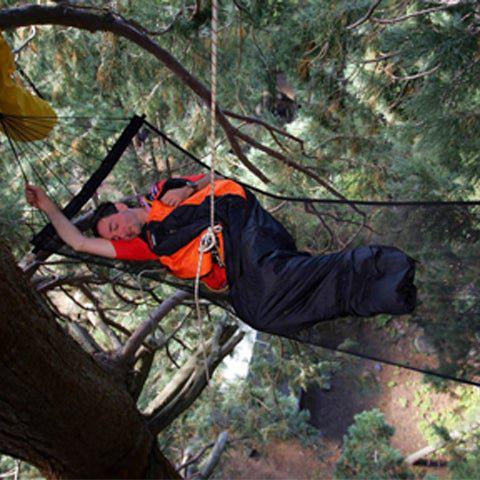Sleeping in a hammock: why or why not?
Are you considering trading your traditional bed for a hammock? If so, you're not alone. Many people are discovering the benefits of hammock sleeping, and in this blog post, we'll explore the reasons why you might want to consider it, as well as a few considerations to keep in mind.
Why Sleep in a Hammock?
-
Improved Sleep Quality: Many hammock enthusiasts report a significant improvement in sleep quality. The gentle rocking motion of a hammock can facilitate faster sleep onset and promote deeper sleep. This rocking motion is similar to the one that soothes babies, and it can have a calming effect on adults as well.
-
Reduction of Stress and Anxiety: The swaying of a hammock can be incredibly relaxing, helping to reduce stress and anxiety. It's akin to a gentle lullaby for your body and mind, creating a peaceful environment that can help you unwind after a long day.
-
Better for Your Back: Contrary to what some might think, a hammock can be excellent for your back. When set up correctly, a hammock conforms to your body's natural curves, offering support without the pressure points associated with traditional mattresses. This can lead to reduced back pain and improved spinal health.
-
Improved Circulation: Sleeping in a hammock can elevate your upper body, which can aid in circulation and reduce congestion. This position can be beneficial for people with certain medical conditions, such as acid reflux.
-
Space Saver: A hammock takes up less space than a traditional bed, making it an excellent choice for small living spaces or for those who prefer a minimalist lifestyle. It's also easy to set up and take down, which is ideal for people who love to rearrange their living spaces frequently.
Considerations Before Making the Switch
-
Getting Used to It: It might take some time to get used to sleeping in a hammock, especially if you're accustomed to a firm mattress. Be patient and give yourself time to adjust.
-
Temperature Regulation: Hammocks can be cooler to sleep in since air circulates all around your body. Consider this if you're someone who gets cold easily and make sure to have warm blankets or a sleeping bag.
-
Quality and Durability: Invest in a high-quality hammock that's durable and designed for sleeping. Cheap hammocks might not provide the support and comfort needed for a good night's rest.
-
Proper Setup: Ensure your hammock is set up correctly to avoid falls or discomfort. The ideal angle for the hammock's straps is about 30 degrees to the horizontal, and the hammock should have a slight sag in the middle.
In conclusion, sleeping in a hammock offers numerous benefits, including improved sleep quality, reduced stress, and better back support. While it may not be for everyone, and it does require some adjustment, the advantages can be significant. Give it a try – you might just find yourself having the best sleep of your life, swaying gently under the stars or in the comfort of your home.







